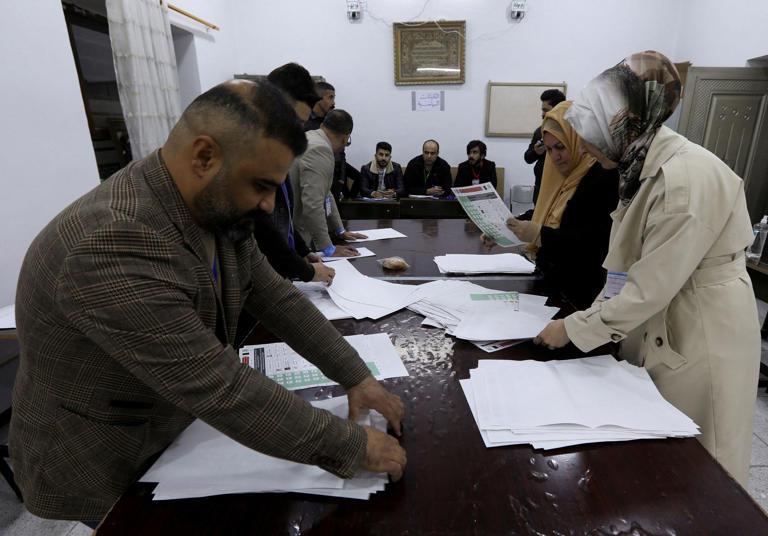
Iran-backed political parties sweep Iraq’s local elections in Shiite heartland
Alliances led by Iran-backed Shiite militias and former prime minister Nouri Al Maliki swept the local elections in the Shiite-dominated provinces of central and southern Iraq as well as Baghdad, despite low voter turnout, the country’s electoral commission announced on Tuesday.
On Monday, Iraq held its first provincial council elections in more than a decade. Supporters of Iraq’s influential Shiite cleric Moqtada Al Sadr – the main rival of Mr Al Maliki and Iran-allied militias – and others boycotted the voting.
The overall turnout was 41 per cent, according to the Independent High Electoral Commission, which announced only 94.4 per cent of the preliminary results.
Nabni (We Build) Alliance, which brought together powerful Iran-backed Shiite militias, came first in the provinces of Babil, Thi Qar, Diwaniyah, Najaf and Maysan. It came second in Baghdad, Al Muthana and Basra.
Mr Al Maliki’s State of Law alliance came first in the province of Al Muthana and second in Maysan, Diwaniyah, Karbala, Babil, Wassit, Thi Qar and Najaf. It was third in Baghdad, Babil, Wassit and Basra.
After serving two terms as prime minister between 2006 and 2014, Mr Al Maliki sought a third term, but he was forced out from office as ISIS swept through northern and western Iraq, amid a rapid collapse in security.
The State Forces Alliance, led by cleric Ammar Al Hakim, also performed well in the Shiite-dominated provinces compared to their performance in the 2021 national elections.
A notable exception came in the southern oil-rich province of Basra, where a list backed by popular governor Asaad Al Eidani came first.
Mr Al Sadr’s move to boycott the elections has helped his rivals to strengthen their presence in these provinces as they did inside parliament when he ordered his supporters to resign and withdraw from the political process last year.
The election boycott “diminishes its legitimacy domestically and internationally, and reduces the influence of corrupt individuals in our beloved Iraq”, Mr Al Sadr told his supporters last month.
Among the Sunnis, the Taqadum Alliance led by ousted parliament speaker Mohammed Al Halbousi came first in his hometown of Anbar and the capital Baghdad. It also won seats in the Sunni-dominated provinces of Nineveh and Salaheddin, as well as Diyala, which has a mixed population.
Mr Al Halbousi’s remarkable win will strengthen his political clout after his dismissal last month.
In the ethnically mixed city of Kirkuk in northern Iraq, the Kirkuk Is Our Strength Alliance, led by the Patriotic Union of Kurdistan party, or the PUK, came first, followed by Arab and Turkmen alliances.
The PUK is one of the main two Kurdish parties. Its rival, the Kurdistan Democratic Party, came first in northern Nineveh province.
The highest turnout of 66 per cent was registered in the contested province of Kirkuk, which is claimed by Kurds, Arabs and Turkmen.
It was followed by the Sunni-dominated provinces of Salaheddin, north of Baghdad, and Anbar, to the west, with 59 per cent and 57 per cent respectively.
The lowest turnout was in the Shiite-dominated provinces in southern and central Iraq as well as Baghdad, mainly due to the boycott of Mr Al Sadr and the pro-reform activists.
The vote took place in only 15 of the 18 provinces. Three provinces, which form the Kurdish region in northern Iraq, operate under a separate autonomous system.
The local elections were last held in April 2013, and have been delayed since due to security concerns after ISIS swept through nearly a third of Iraq in mid-2014, but were eventually defeated.
This was followed by widespread unrest due to pro-reform protests which broke our in October 2019 and the harsh response by the Iraqi government at the time.
Source » msn





